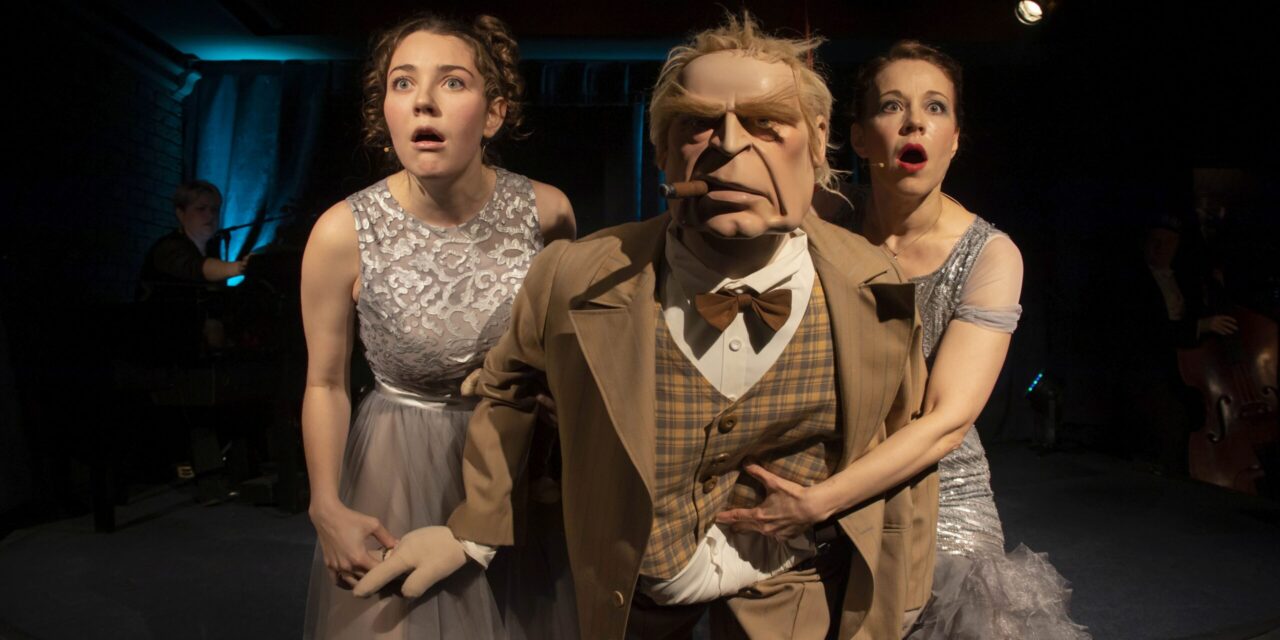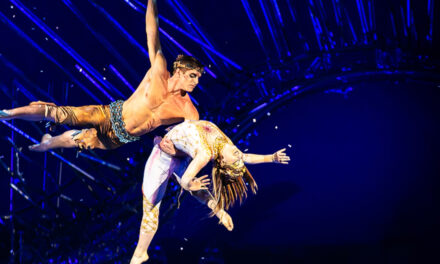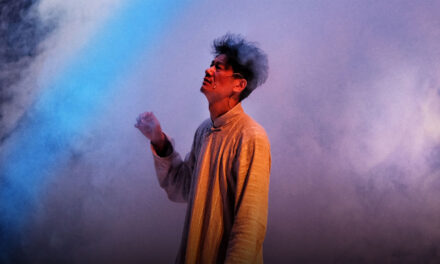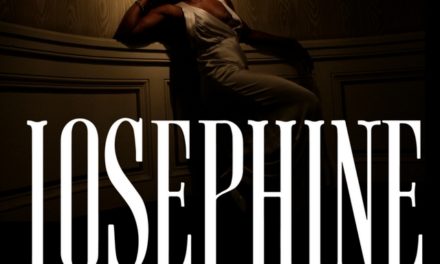If the United States again accuses Russia of interfering in the election, it will almost certainly be the Vakhtangov Theatre that is to blame because it is the culprit of its own, all-theatrical celebration – the theater turns 100 next year!
Here, in the space of an art-cafe, a person who suspiciously resembles Trump dances in front of the audience; from the stage the performers clearly show that he is nothing more than a marionette in the hands of skilled puppeteers. Moreover, in the hands of several women it has added piquancy.
Indeed, the stars aligned so that the cabaret’s name Mr. Twister – Marshak-Jazz Cabaret unwittingly coincided with many other themes and moods of our times. It is not difficult to see them even while wearing a mask – a relatively new companion to the avid theatergoer. The art-cafe is a cozy space designed for creative meetings between the Vakhtangov Theater’s artists, among other things. It also hosts public performances and readings. Instead of taking on it’s traditional format of a reading or a conversation about art and her work, artist Anna Dubrovskaya decided to stage this fully-fledged performance. Though it is short, it is full-blooded.
The show’s author Samuel Marshak – Russian poet, playwright, translator, literary critic, and screenwriter – is the author of several popular children’s books. Many generations of Soviet children grew up on his poems. As a poet, translator, and literary critic, he had a huge influence on the development of Soviet children’s literature. As a poet-translator, he made a huge contribution to the practice of Russian literary translation. He is the author of classic translations of sonnets by William Shakespeare, songs and ballads by Burns, poems by Blake, Wordsworth, Keats, and Kipling, among a myriad of others. For his translations of Burns’ writings, Marshak was awarded the title of honorary President of the Robert Burns World Federation in Scotland in 1960.
“Mister Twister” (excerpt) Samuel Marshak translated from the Russian to the English by Julian Lowenfeld:
There is overseas, a firm, Thomas Cook,
if bored, if you please, and you wish to look
at the Isle of Tahiti, the snowy Pamirs,
or else to visit “gay Paree”,
it takes Cook a minute,
your ship cabin’s booked.
…
Mister Twister,
Man of great worth,
Owner of factories, ships, journals, boats
Decided at leisure to sail ’round the world
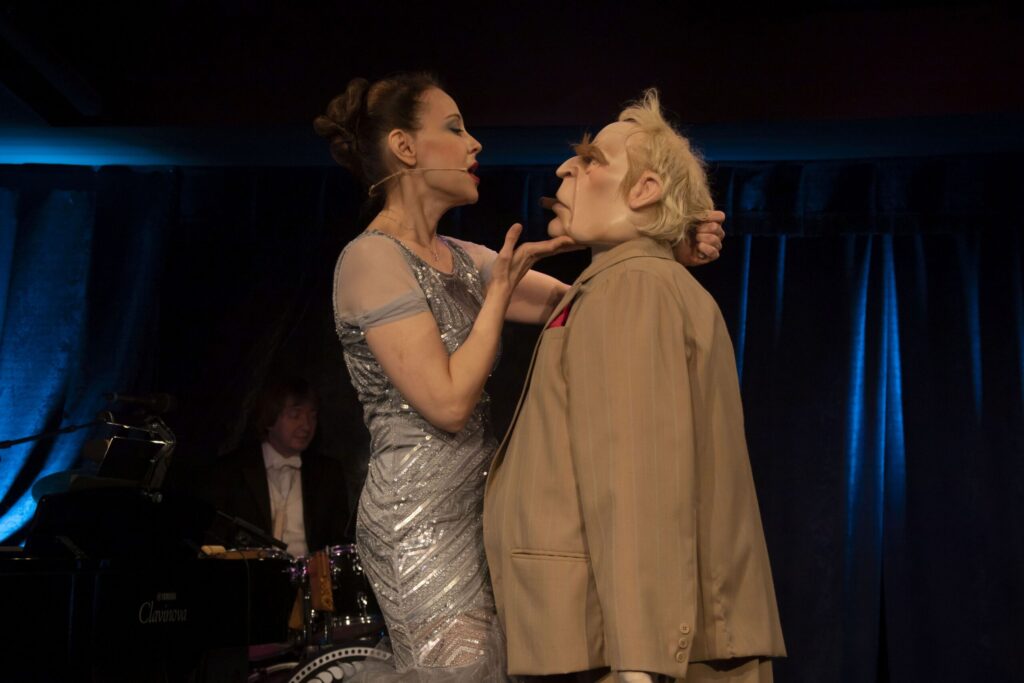
Anna Dubrovskaya and Mr.Twister, Mr. Twister – Marshak-Jazz Cabaret. Director Elena Kotikhina. Vakhtangov Theatre, Moscow Russia, 2020. Photo by Valery Myasnikov from Press office of Vakhtangov Theatre.
The cabaret’s plot is based on an almost-anecdotal story about a respectable capitalist, Mister Twister, who flatly refuses to take a room in a Soviet hotel because Black people are staying next door. The American millionaire businessman and banker, who is also a former Minister, and owner of factories, newspapers and steamboats has to sleep on a chair in the hallway as punishment for his racism. Overnight, Mister Twister is sobered by a terrible dream in which he is a homeless person who fails to find shelter even in his own mansion. The decidedly-polite, “No seats!” that he hears at the doors of Leningrad hotels turns into a phantasmagoric “No seats in America!”
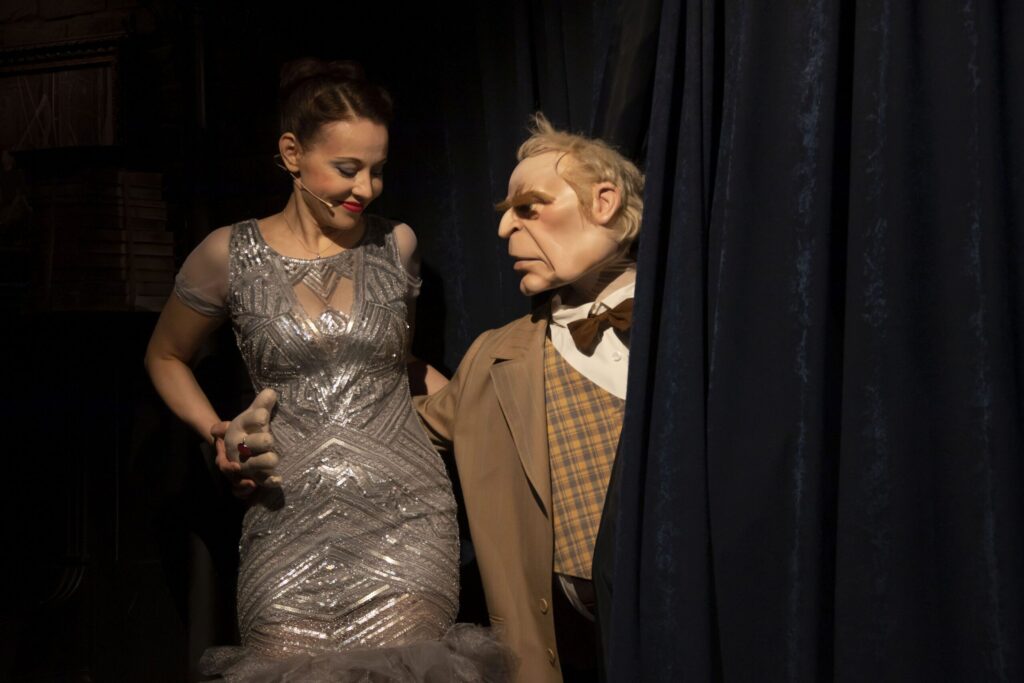
Anna Dubrovskaya and Mr.Twister, Mr. Twister – Marshak-Jazz Cabaret. Director Elena Kotikhina. Vakhtangov Theatre, Moscow Russia, 2020. Photo by Valery Myasnikov from Press office of Vakhtangov Theatre.
Who would have expected a story from the 1930s about a racist millionaire, who immigrated to the country of heroes, dreamers and scientists with his family, would sparkle with new color in 2020? The Black Lives Matter movement is taking over majority white nations, but Mr. Twister doesn’t like people of color. Performers Anna Dubrovskaya and Nina Andronaki with director Elena Kotikhina seem surprised by the current relevance of their short show.
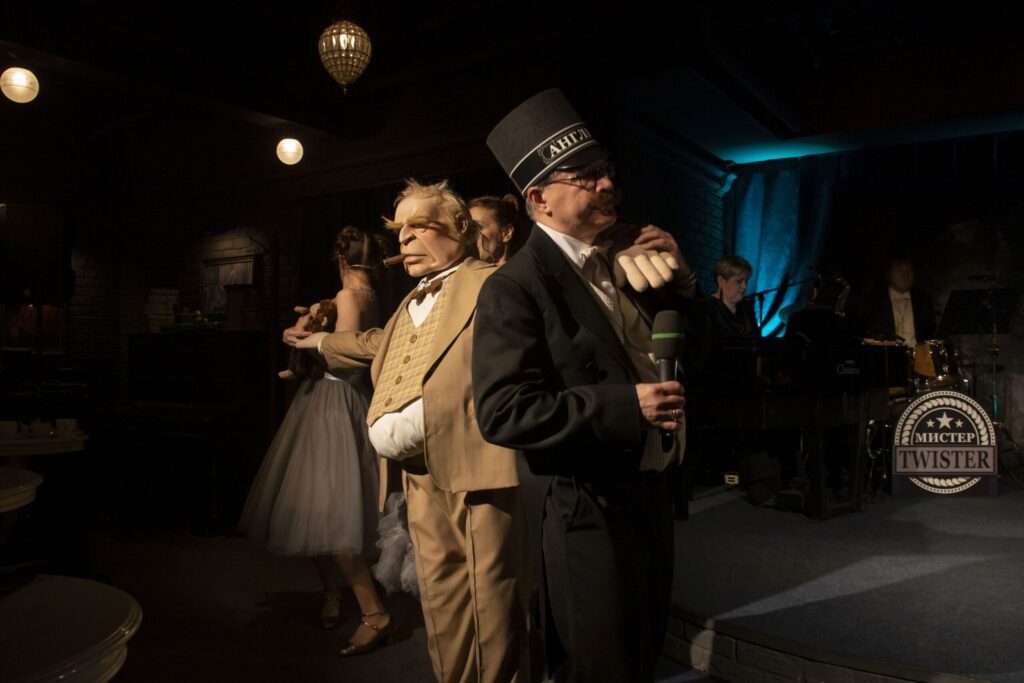
Ensemble, Mr. Twister – Marshak-Jazz Cabaret. Director Elena Kotikhina. Vakhtangov Theatre, Moscow Russia, 2020. Photo by Valery Myasnikov from Press office of Vakhtangov Theatre.
In pleasant semi-darkness and beautiful surroundings (the designer is Maxim Obrezkov), soothing music is interrupted from time to time by quotes from Aurelius Augustine, Anatole France, Mark Twain and Ernest Hemingway, who all agree on one thing – the benefits of travel. Needless to say, in the current pandemic era, these quotes sting somewhat given that travel remains only in memories, dreams and stories. At least Mr. Twister (Marshak-Jazz Cabaret) is a theatrical travelogue that offers a musical journey through time and space.
The show is accompanied by light and lively jazz improvisations by the Vakhtangov Theatre Orchestra, marches by Isaac Dunaevsky and Cole Porter foxtrots motifs from “Sun Valley Serenade.” This music is joined by freestyle raps.
The inclusion of jazz is not accidental, because it is a combination of African-American and European music. This is consistent with Marshak’s story. The medley evokes nostalgia for those who grew up in the Soviet era and know Marshak’s poems by heart, but those who know more about Twitter than Mr. Twister don’t get bored, either. This is a rare case of an uncompromising performance that is equally interesting to children and adults alike. Marshak is able to easily and playfully tell children about adults without this being lost in the play.
The arrangements, as well as the orchestra’s performance, are at their best. This includes the musicians’ acting – they are definitely acting, albeit in less direct way. Everything is in time: the music’s harmonies, the musical numbers and the beautiful voices of Dubrovskaya and Andronaki are never lost at any point in the performance.
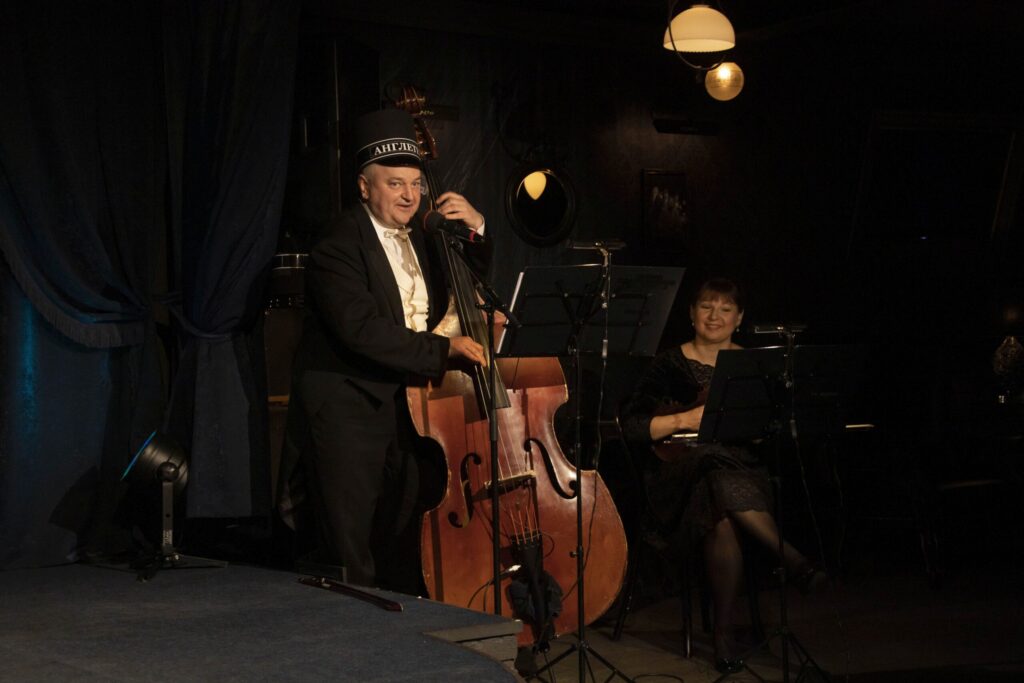
Vakhtangov Theatre Orchestra, Mr. Twister – Marshak-Jazz Cabaret. Director Elena Kotikhina. Vakhtangov Theatre, Moscow Russia, 2020. Photo by Valery Myasnikov from Press office of Vakhtangov Theatre.
When we bask in nostalgia upon hearing stanzas from our childhood about a former Minister who decided to travel around the world at his leisure, we are challenged to ponder the Soviet ideologies of the text. Over the years, the messages of the poem derived from Mister Twister’s propaganda have become obvious, and it is hardly surprising that the former Minister is a millionaire. However, all this pales before the author’s melodious, sonorous and rhythmic text. The text and its rhythm are the starting points for the performance, and elevate its two performers.
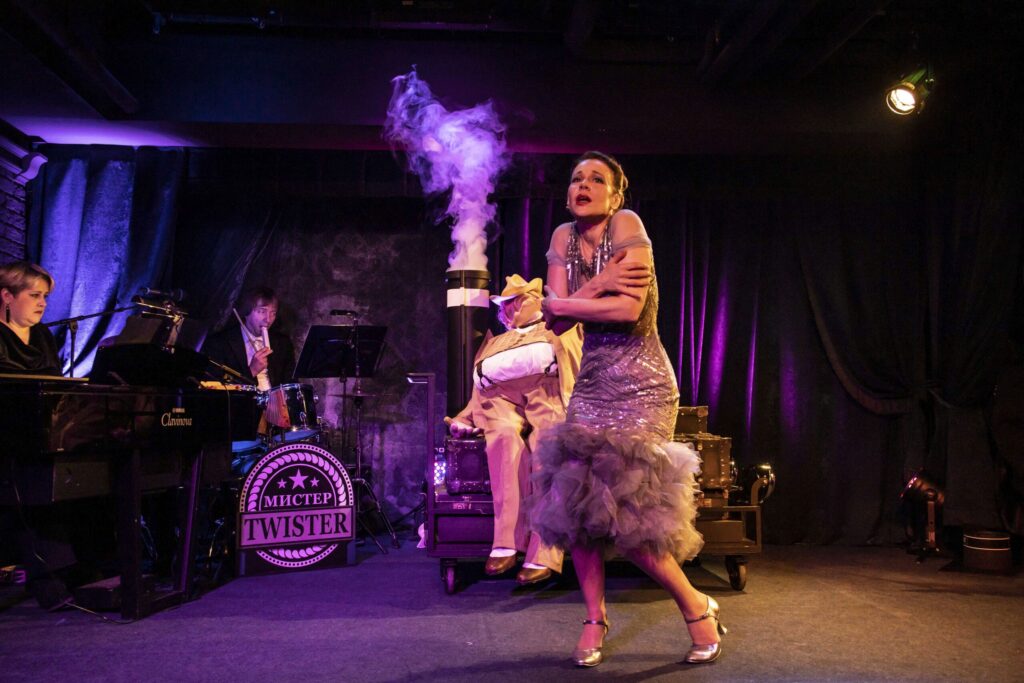
Anna Dubrovskaya and Mr.Twister, Mr. Twister – Marshak-Jazz Cabaret. Director Elena Kotikhina. Vakhtangov Theatre, Moscow Russia, 2020. Photo by Valery Myasnikov from Press office of Vakhtangov Theatre.
The performance style is also mirrored in the character’s name of Twister. A twister is a whirlwind, an inventor, a puzzle and something tied up. Surprisingly, much of the performance captures these meanings of the word. The audience feels as though they are in the hold of a large steamer ship caught in a storm, with sharp musical twists setting this mood. Joseph Brodsky wrote that, “only the bottle in a bar will tolerate pitching”, but even though the audience is rocking in different directions, they appear to enjoy it.
The creators did not set out to comment on the present day, so all contemporary relevance remains in the eye of the beholder. Some people will focus on Mr. Twister’s thoughts. Some will be moved to tears of laughter because of the similarity Twister has to Donald Trump given the character is portrayed by a life-size doll with Trump’s trademark features and catchphrases. Then, others will be carried away by their thoughts about the feminist show created mainly by women who turn a man into a doll.
The epigraph of Marshak’s poem, which is included in the play, is a phrase from an old travel guide: “Arriving in the country, try to observe its laws and customs to avoid misunderstandings….” The similarities between the performance and the present day means the show serves as a guide, winding its way between domestic and foreign locations, Soviet and post-Soviet times, and finally satire and travesty.
Mr. Twister (Marshak-Jazz Cabaret) in the Vakhtangov Theatre deceived the expectations of both the public and its own creators. The character completely surpassed them. Capacious, dynamic and full of humor, the show is not just fun, but jokes with the audience without any trace of malice. This is also the case when the words that come from the stage make you want the show to mirror the performance – let it have the same problems as Twister does in Leningrad hotels, so there will never be an empty seat.
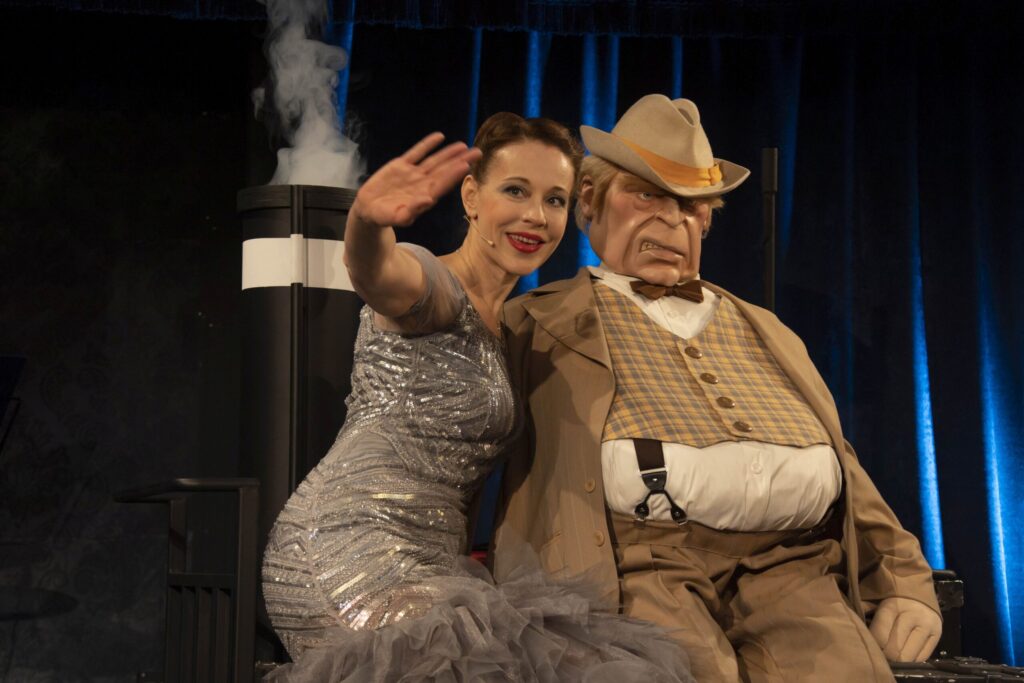
Anna Dubrovskaya and Mr.Twister, Mr. Twister – Marshak-Jazz Cabaret. Director Elena Kotikhina. Vakhtangov Theatre, Moscow Russia, 2020. Photo by Valery Myasnikov from Press office of Vakhtangov Theatre.
This post was written by the author in their personal capacity.The opinions expressed in this article are the author’s own and do not reflect the view of The Theatre Times, their staff or collaborators.
This post was written by Emiliia Dementsova.
The views expressed here belong to the author and do not necessarily reflect our views and opinions.

